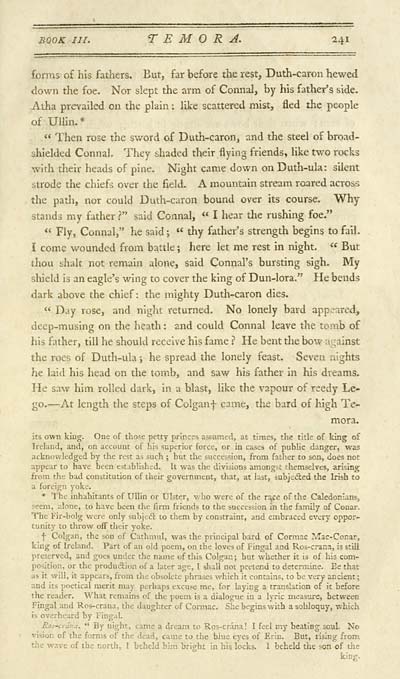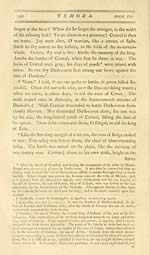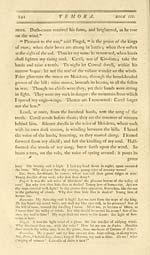Download files
Complete book:
Individual page:
Thumbnail gallery: Grid view | List view

BOOK III. T E M O R A. 241
forms of his fathers. But, far before the rest, Duth-caron hewed
down the foe. Nor slept the arm of Comial, by his father's side.
Atha prevailed on the plain : like scattered mist, fled the people
of UlHn.*
" Then rose the sword of Duth-caron, and the steel of broad-
shielded Connal. They shaded their flying friends, like two rocks
with their heads of pine. Night came down on Duth-ula: silent
strode the chiefs over the field. A mountain stream roared across
the path, nor could Duth-caron bound over its course. Why
stands my father ?" said Connal, « I hear the rushing foe."
" Fly, Connal," he said ; " thy father's strength begins to fail.
I come wounded from battle ; here let me rest in night. " But
thou shalt not remain alone, said Connal's bursting sigh. My
shield is an eagle's wing to cover the king of Dun-lora." He bends
dark above the chief: the mighty Duth-caron dies.
" Day rose, and night returned. No lonely bard appeared,
deep-musing on the heath : and could Connal leave the tomb of
his father, till he should receive his fame ? He bent the bow against
the roes of Duth-ula \ he spread the lonely feast. Seven nights
he laid his head on the tomb, and saw his father in his dreams-
He saw him rolled dark, in a blast, like the vapour of reedy Le-
go. — At length the steps of Colganf came, the bard of high Te-
mora.
its own king. One of those petty princes assumed, at times, the title of king of
Ireland, and, on account of his superior force, or in cases of public danger, was
acknowledged by the rest as such ; but the succession, from father to son, does not
appear to have been established. It was the divisions amongst themselves, arising
from the bad constitution of their government, that, at last, subjeded the Irish to
a foreign yoke.
• The inhabitants of Ullin or Ulster, who were of the r^ce of the Caledonlansj
seem, alone, to have been the firm friends to the succession in tiie family of Conar.
The Fir-bolg were only subjedl to them by constraint, and embraced every oppor-
tunity to throw off their yoke.
f Colgan, the son of Cathmul, was the principal bard of Cormac Mac-Conar,
king of Ireland. Part of an old poem, on the loves of Fingal and Ros-crana, is still
preserved, and goes under the name of this Colgan ; but whether it is of his com-
position, or the production of a later age, I shall not pretend to determine. Be that
as it will, it appears, from the obsolete phrases which it contains, to be very ancient;
and its poetical merit may perhaps excuse me, for laying a translation of it before
the reader. AA'hat remains of the poem is a dialogue in a lyric measure, between
Fingal and Ros-crana, the daughter of Cormac. She begins with a soliloquy, which
is overheard by Fingal.
Ros-crai:a. " By night, came a dream to Ros-crana! I feel my beating soul. No
vision of the forms of the dead, came to the blue eyes of Erin. But, rising from
the wave of the north, 1 beheld him bright in his locks. I beheld the son of tiie
kincr-
forms of his fathers. But, far before the rest, Duth-caron hewed
down the foe. Nor slept the arm of Comial, by his father's side.
Atha prevailed on the plain : like scattered mist, fled the people
of UlHn.*
" Then rose the sword of Duth-caron, and the steel of broad-
shielded Connal. They shaded their flying friends, like two rocks
with their heads of pine. Night came down on Duth-ula: silent
strode the chiefs over the field. A mountain stream roared across
the path, nor could Duth-caron bound over its course. Why
stands my father ?" said Connal, « I hear the rushing foe."
" Fly, Connal," he said ; " thy father's strength begins to fail.
I come wounded from battle ; here let me rest in night. " But
thou shalt not remain alone, said Connal's bursting sigh. My
shield is an eagle's wing to cover the king of Dun-lora." He bends
dark above the chief: the mighty Duth-caron dies.
" Day rose, and night returned. No lonely bard appeared,
deep-musing on the heath : and could Connal leave the tomb of
his father, till he should receive his fame ? He bent the bow against
the roes of Duth-ula \ he spread the lonely feast. Seven nights
he laid his head on the tomb, and saw his father in his dreams-
He saw him rolled dark, in a blast, like the vapour of reedy Le-
go. — At length the steps of Colganf came, the bard of high Te-
mora.
its own king. One of those petty princes assumed, at times, the title of king of
Ireland, and, on account of his superior force, or in cases of public danger, was
acknowledged by the rest as such ; but the succession, from father to son, does not
appear to have been established. It was the divisions amongst themselves, arising
from the bad constitution of their government, that, at last, subjeded the Irish to
a foreign yoke.
• The inhabitants of Ullin or Ulster, who were of the r^ce of the Caledonlansj
seem, alone, to have been the firm friends to the succession in tiie family of Conar.
The Fir-bolg were only subjedl to them by constraint, and embraced every oppor-
tunity to throw off their yoke.
f Colgan, the son of Cathmul, was the principal bard of Cormac Mac-Conar,
king of Ireland. Part of an old poem, on the loves of Fingal and Ros-crana, is still
preserved, and goes under the name of this Colgan ; but whether it is of his com-
position, or the production of a later age, I shall not pretend to determine. Be that
as it will, it appears, from the obsolete phrases which it contains, to be very ancient;
and its poetical merit may perhaps excuse me, for laying a translation of it before
the reader. AA'hat remains of the poem is a dialogue in a lyric measure, between
Fingal and Ros-crana, the daughter of Cormac. She begins with a soliloquy, which
is overheard by Fingal.
Ros-crai:a. " By night, came a dream to Ros-crana! I feel my beating soul. No
vision of the forms of the dead, came to the blue eyes of Erin. But, rising from
the wave of the north, 1 beheld him bright in his locks. I beheld the son of tiie
kincr-
Set display mode to: Large image | Transcription
Images and transcriptions on this page, including medium image downloads, may be used under the Creative Commons Attribution 4.0 International Licence unless otherwise stated. ![]()
| Early Gaelic Book Collections > Ossian Collection > Poems of Ossian, the son of Fingal > (253) |
|---|
| Permanent URL | https://digital.nls.uk/77926326 |
|---|
| Description | Selected books from the Ossian Collection of 327 volumes, originally assembled by J. Norman Methven of Perth. Different editions and translations of James MacPherson's epic poem 'Ossian', some with a map of the 'Kingdom of Connor'. Also secondary material relating to Ossianic poetry and the Ossian controversy. |
|---|
| Description | Selected items from five 'Special and Named Printed Collections'. Includes books in Gaelic and other Celtic languages, works about the Gaels, their languages, literature, culture and history. |
|---|

